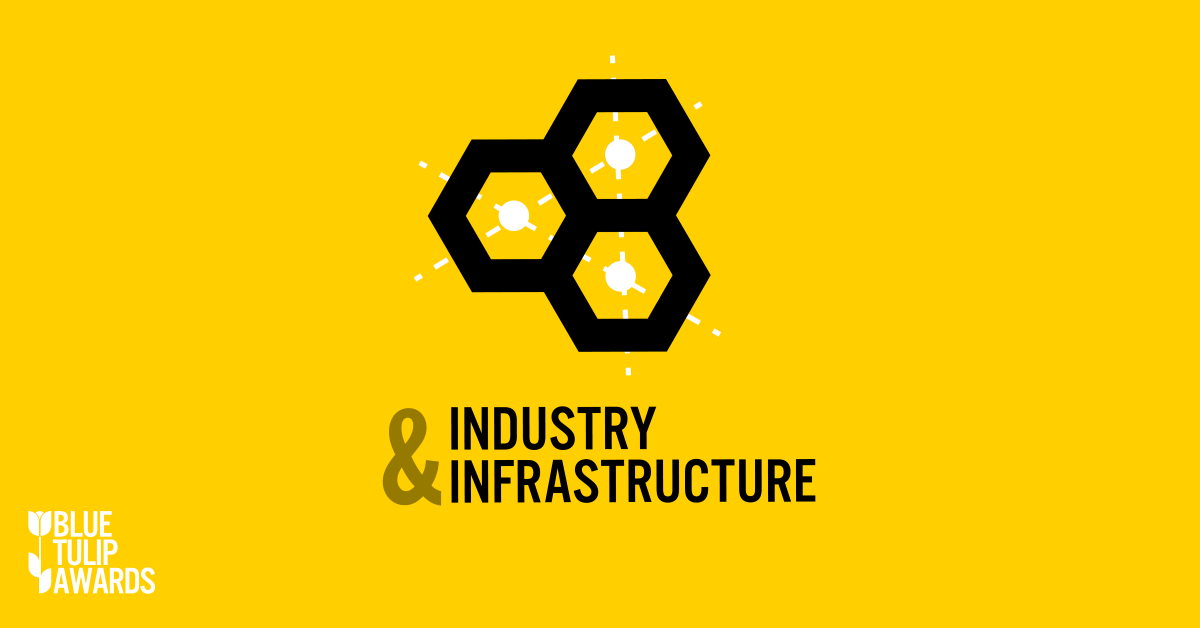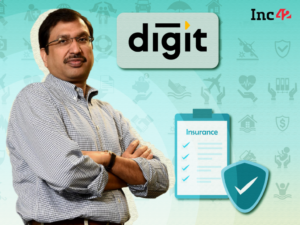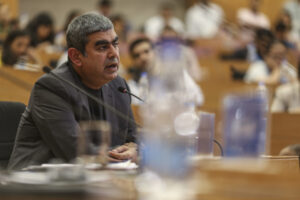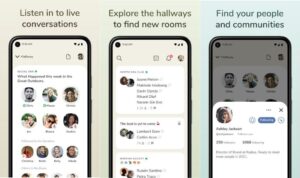Globalisation has brought the world to our doorsteps. We can order products from the other side of the world or build upon innovations from many countries. But it’s not without its challenges, and global manufacturing often gets in the way of sustainability and equality. The third generation of the Blue Tulip Awards aims to find solutions to the most pressing problems in the Industry & Infrastructure theme.
Industry & Infrastructure in a post-COVID world
And then there’s COVID-19. Effectively shutting down global manufacturing for months on end. Another sign that the system we rely on is vulnerable. So we asked this year’s Blue Tulip Award partner Daan Akse from Growth Tribe, last years’ award winner Patrique Zaman from Avy – Drones for good and jury member Anne Laurentie from Accenture for their vision.
COVID: Leading digital transformation since ’19
“I saw a joke the other day”, says Daan Akse. He is head of innovation at Growth Tribe and he knows how to start an interview off right. It was a slide with the question ‘Who led your digital transformation?’. The choices for answers were ‘CEO’, ‘CIO’ or ‘COVID-19’, with the last one being circled as the correct answer. Funny but true, says Akse. “It shows that change is not driven by technology. It’s driven by people when they are provided with the right incentive.”
Akse thinks businesses must embrace change as a constant factor. “It is crucial to driving any system to become more risk-informed, it’s how the world works these days.” He refers to the last years’ risk report of the World Economic Forum, published in January. Infectious diseases sat in the top 10 risks. In other words: we could’ve seen it coming. “As humanity, we have a boatload of problems. Look at the past 20 years, with 9/11, the 2007 financial crisis, Trump getting elected, the rise of smartphones. It’s extremely relevant to prepare for change. COVID might’ve been an anomaly, but in reality, change is the only constant right now.”
Avy – Drones for good rethinking its supply chain
Patrique Zaman found that out the hard way last year. His company Avy won the Blue Tulip Awards last year in the mobility category. Before COVID had spread across the world Zaman knew it would change a lot: “We ship rare components for our drones from China. In January last year, before COVID-19 was an issue here, that came to a halt.”
It showed Avy how dependent they were on parts from China and it forced them to rethink their supply chain, says Zaman: “We’re trying harder now to make more components ourselves, or to buy them in The Netherlands or somewhere near. This way we want to limit our dependencies on others. An added advantage is that it is easier to control the quality and sustainability.”
High-speed, autonomous drones with large range
Despite the struggles, Avy has been pushing ahead with its innovative drones. Their solution, an emission-free, autonomous, winged drone with a large range and the ability to take off and land vertically, offers opportunities for first responders or health care workers. Zaman says they’ve doubled their number of employees, quite a feat during a global pandemic. They need all the help they can get. For instance, a new partnership in the UK allows Avy to create a national medical network connecting hospitals and blood banks.
Reconstructing their supply chain is not easy, found Zaman. Also because many elements still operate in a way that worked in the pre-pandemic world. “Lots of trading happened for us on trade shows. We planned to attend 18 of them, but all of them were cancelled. So it’s harder to meet new people and it forced us to utilise our existing network more. We had to make sure we were more visible online. It was educational.”
Office building of the future
For Anne Laurentie, a world in which meeting face-to-face is complicated, also means that the industry needs to re-imagine the way office buildings look and function in the future. “The place of work needs to be a place of safety and security. Not only during a pandemic but also with regards to climate change or other future threats.” Laurentie is Managing Director at Accenture Netherlands Strategy & Consulting where she leads the Industry X Intelligent Products & Platforms department.
In her role, she imagines the future of the offices as the LEGO-like blocks. “Make a building completely adaptable to workers’ needs by transforming an existing facility into something flexible.” According to Laurentie, the pandemic has proven the way we use offices needs to be redefined. Using co-working spaces for when there is no opportunity to work from home and multifunctional office spaces that provide strict and automated security, while also keeping an eye on sustainability and offer equal access to all.
Equality for all in the office
“Diversity in teams is essential. To get the right insights and creativity, you need diversity in people providing input and solutions.” Laurentie stresses that equality needs to apply to everyone. “There are many people with disabilities in different sets of jobs. They also need to be able to work seamlessly together with others. How do you do that when you still need help getting in the elevator? Flexibility needs to be the core of the office space of the future. I’m really keen on adapting existing offices”, says Laurentie. “How can we adapt to the new needs, and control which resources are used? We could make more use of, for instance, 3D-printed components and sustainable materials to transform the inside and outside of buildings.”
Changing the industry in a way Laurentie envisions would require certain skill sets. “We need engineers that are smart construction experts, skilled in using new materials or using existing materials in new ways. That means there’s also an important role for chemists and biologists. They can use sustainable functions that nature provides us with for new purposes.” And that would require the right software developers, stresses Laurentie. “But we need to work with them as they require the right input to create new technologies. A combination of skills between different scientific areas, data analytics and artificial intelligence is crucially game-changing.”
Data is key
For Akse, the main skill that prepares the next generation for the digitization of industries is ‘data analysis at scale’. “It’s how Big Tech became so successful. The notion of collecting data, creating a hypothesis and running experiments. I think every company needs to be able to run, at the very least, a basic data pipeline.”
Akse sees a last mile problem where organizations fail to get significant value from data science because insights get lost in translation when explained to business stakeholders. Beyond that there is a general lack of data capabilities across organizations, because the rest of the business is not data literate enough. “All in all, there is a very real gap between data and the value derived from it,” says Akse. “Closing this gap is the key to unlocking real progress.”
The benefits of collaboration
Akse thinks the ambition to decentralisation is understandable, considering what happened last year. However, he argues there are more benefits with regards to equality and sustainability in the collaboration of centralized institutions and startups.
Akse: “Innovation takes a lot of time at corporates and governments. On the other side of the spectrum there’s a typical startup; super quick in innovation but with too little resourcing to distribute their solution at scale. The Blue Tulip Awards are a great opportunity for these actors to meet.”
Startup cooperating with KLM
Zaman can attest to that. Winning the Blue Tulip Awards has brought his company in close contact with Dutch airliner KLM. “Due to their size, they sometimes find it hard to drive the kind of innovation that we’re good at, while we can’t operate on the scale they do. We’re now researching ways to cooperate since our goals are pretty much aligned.”
Besides getting in touch with KLM, Zaman says the Blue Tulip Awards brought them acknowledgement and credibility. “Before winning the award, we spent a couple of years in our cave to tinker with our product. It’s really cool to step out and receive this praise.”
Impact of Blue Tulip Awards
The fact that Blue Tulip Awards focus on innovations with impact, makes it extra worthwhile, says Zaman. “Having a social impact does not always make the most money, especially in these times. But many entrepreneurs are doing cool things and the Blue Tulip Awards can play an important role in their development.”
Now that physical meetings are not possible, Laurentie is glad that Blue Tulip Awards found a way to continue. “Virtually, everything is possible. So why not? We need to continue innovation and help smaller companies to get advice, attention, and publicity. Even though we select one or two as winners, it can create momentum for most of them. I’m hoping to see the golden idea. Something I never thought of. I want to be blown away.”
Register now for the Industry & Infrastructure theme
The third generation of the Blue Tulip Awards is now open for registration. Can you make the global infrastructure resilient against whatever lies ahead? Do you have an idea to make industries more sustainable or fair? Innovators in the world of Industry & Infrastructure eager to change the world can sign up on the website of the Blue Tulip Awards. Registration is open now, you have until April 11th so don’t wait.










